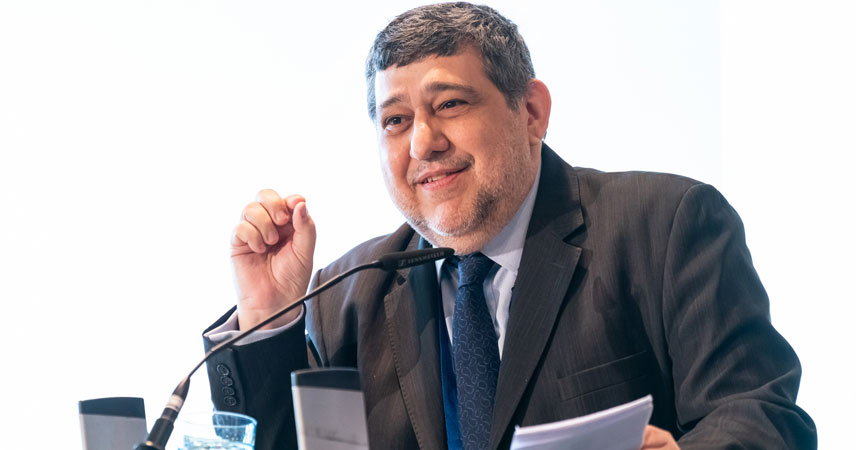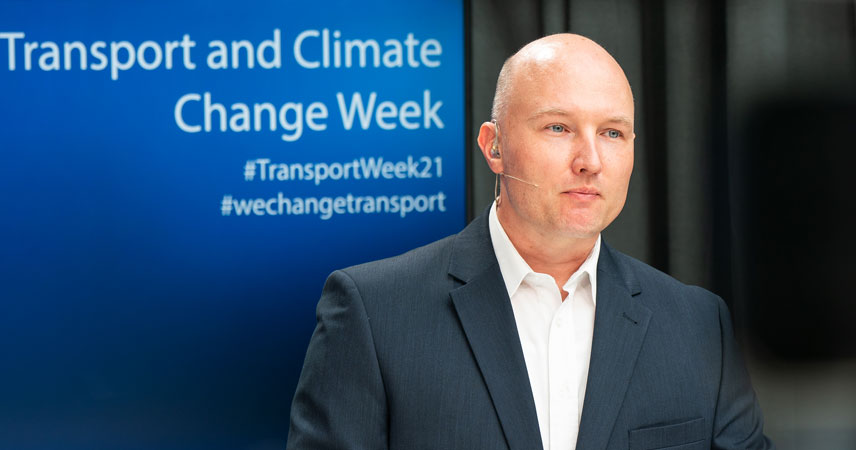Interview
“We are doing pioneer work”
Green hydrogen is considered an important building bloc in decarbonisation. Where are we in this context?
Eduardo Soriano: We are still at the very beginning with PtX and thus with green hydrogen. While the technology is basically there, we are still far away from any kind of large-scale application. But PtX is an interesting technology for Brazil because we have a very large electrical system and instead of storing, we can transform one form of energy to another, including hydrogen.

What does PtX stand for exactly?
Torsten Schwab: Power-to-X or PtX stands for the production of molecules using electricity and encompasses the whole value chain from electricity generation all the way to the final product (i.e. the “X”). Hydrogen comes into play because it is most often the crucial element for the chemical reactions. And green means that the electricity and all other involved molecules are of renewable nature.
Why is green hydrogen so important? What is its role in the global energy transformation?
Schwab: Green hydrogen is the link between renewable electricity and renewable carbon. Carbon is used in most industrial and chemical processes, for fuels, but also for plastics, textiles etc. The carbon we use so far, however, comes mainly from fossil sources, which is the major cause for global warming. We need to replace fossil carbon with non-fossil carbon. And we can produce the industrially sought-after hydrocarbons with the help of green hydrogen.
Soriano: It is really important that the hydrogen used is green. That means the electricity needed to produce it must come from renewable sources like wind, solar or water. Since the potential in a country like Brazil for renewables is very high, we meet an important requirement for green hydrogen.

But is green hydrogen not in business already? In Norway, for example, cars are running on it.
Schwab: That is correct. There are hydrogen-based cars in some places. But those are isolated prototypes, what we really need is to establish a whole green supply chain for all products. We need hydrogen, carbon and subsequently hydrocarbons and other derived products which are mainly fossil-based so far to become green on large scale.
Soriano: Brazil started in the early 2000s with a very strong focus on the use of hydrogen in buses, but this was abandoned because the race for hydrogen had stopped in the whole world. Now it is resumed.
What exactly can you do with this green hydrogen?
Schwab: Hydrogen is a versatile helper. It can efficiently be transformed into electricity and heat, or be transformed – together with other molecules – into higher-value products. For instance, by adding carbon to the equation, one can produce one can get synthetic crude oil that is like a clean version of fossil crude oil. From there it can be used for the same purposes we use crude oil today: fuels for transport, the production of plastics, lubricants, etc.
Soriano: This synthetic crude oil can also be processed into jet fuel, for instance. That is costly for now, but with the right business model, it is not far-fetched. And we would have a green alternative to fossil jet fuel. This is really important, because for the world´s mobility, there are clean alternatives for cars, trucks and trains but not yet for ships and planes. As long as this is the case, we need alternative jet fuels.
To produce this kind of alternative fuel what does it need?
Soriano: Simply said, air and a lot of electricity. And hydrogen is needed throughout the process. That is the reason why it is such an important element for a clean energy future. So, we can produce alternative jet fuel from air and electricity. We think this process is very promising, precisely because all the necessary feedstocks are available anywhere. Generally speaking: Each region can use its local potential for the production of synthetic fuel. Industrial and agro-industrial waste and by-products can also be used.
Is this still theory or already practice?
Soriano: Both, theory as for the commercial application, but practice as for the first demonstration plants entering in operation. In Brazil we want to show that this really works, that we can create alternatives for powering airplanes, both with more traditional biomass feedstocks and with cutting edge PtX concepts. That´s why we are preparing a PtX concept, which we believe could be the first commercially viable application to provide locally produced jet fuel for remote air strips. Part of the concept is a reference plant, to be built in cooperation with GIZ and the German Government in the framework of a project called ProQR.
Where will this plant be built? Or in other words: How far has the project progressed?
Soriano: Currently the ministry is investing in two research plants based at universities; the projects will start in mid-2022. The construction of commercial plants is still depending on business investment from both the Brazilian and German side. Our main challenge will be to pass the so-called Death Valley of Innovation, progressing from research to successful large-scale implementation.
Would you consider this project to be a pioneering undertaking?
Schwab: Definitely, this is pioneering work, because we have to get the market for PtX and thus for green hydrogen going. This project provides one of the very sought-after business cases.
Soriano: The technology is the one side. But we are also thinking about new business models for airports, equipment manufacturers or aviation companies. Imagine, for example, an airplane manufacturer not only selling airplanes, but also fuel production units: Especially for remote airports in the tropical forest, the dessert, or on islands this might be suitable. That way an airplane manufacturer could potentially lease a plane with fuel costs imbedded in the lease. So, PtX offers a lot of new possibilities, some of which might sound crazy today.
How much longer will it take until plants like that are really ready for the market?
Soriano: Depending on the scale, the first commercial plants to produce alternative jet fuels like we described will probably be available within the next five years. For something that can be bought off the shelf and directly rolled-out it might need up to ten more years. That is why we have to hurry. The progress also depends on further international regulatory enforcement.
Are you personally convinced of this technology and its potential for the future?
Schwab: It´s the way to go. No question in my mind. This is also why I am fully dedicated to our work at the PtX Hub here in Berlin. With PtX concepts renewable electricity can now be the solution for all sectors and applications which today can only rely on fossil crude oil and its derivates. Our mandate is to bring knowledge about this to decision-makers around the globe and to bring together people who understand the topic to promote the technology. The project in Brazil is one good start into the future.
Soriano: We might see steps of hybrid aviation in between. But I strongly believe that this technology is important and that it is the beginning of green aviation.
The Project ProQR – Climate-neutral Alternative Fuels is financed by the German Ministry of Environment with the Brazilian Ministry of Science, Technology and Innovation as counterpart. It is implemented by GIZ, with the German Aerospace Center as an executing partner. On both sides, further sectoral institutions and companies joined the project. The objective is the creation of an internationally usable reference case for the production and application of power-to-liquid sustainable fuels for aviation.
March 2022
